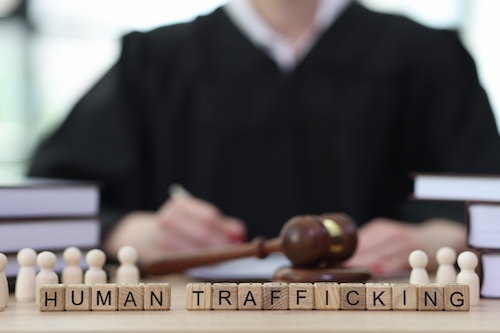Understanding Human Trafficking Charges at the State and Federal Level
Human trafficking charges are among the most serious crimes prosecuted under both Texas and federal law. These cases involve the exploitation of people through force, fraud, or coercion for labor or commercial sex. Whether charged by state authorities or federal prosecutors, the consequences are severe.
In this blog, we explain how human trafficking charges are handled under Texas and federal law, highlight the main differences in prosecution and penalties, and show why working with an experienced federal crimes lawyer is essential for anyone facing these accusations.
What Is Human Trafficking?
Human trafficking charges often involve severe violations of law and human rights. This section explains the legal meaning of human trafficking, the key elements of the crime, and how it affects victims.
Legal Definition of Human Trafficking
Under federal law, human trafficking includes crimes where a person uses force, fraud, or coercion to exploit others for labor or commercial sex. The Trafficking Victims Protection Act (TVPA) outlines the federal statutes used in these prosecutions. Human trafficking may involve adults or children and can occur across state or national borders.
In Texas, Texas Penal Code § 20A.01–20A.04 defines trafficking of persons. This includes recruiting, harboring, or transporting a person for the purpose of labor or services, or for a commercial sex act. Trafficking a person younger than 18 years of age carries enhanced penalties, even without proof of force or fraud.
Elements of the Crime
To bring human trafficking charges, prosecutors must show that the trafficker used one or more of the following:
- Force (such as physical restraint or serious bodily injury)
- Fraud (such as false promises about work or pay)
- Coercion (such as threats, abuse of law or process, or psychological pressure)
These elements help define whether the case involves labor trafficking or sex trafficking. In some cases, victims may also be forced into involuntary servitude or debt bondage.
Exploitation and Victim Impact
Victims of human trafficking often face repeated sexual exploitation, unsafe living conditions, and loss of freedom. Many are denied basic rights and forced to perform labor under threats of harm. Victims may be U.S. citizens or foreign nationals, adults or children.
The National Human Trafficking Hotline provides a way for victims or witnesses to report unlawful conduct and request immediate assistance. This hotline plays a central role in identifying trafficking operations and protecting victims.
Federal Human Trafficking Charges
Federal human trafficking charges apply when the crime involves interstate or international movement, organized criminal activity, or violations of federal statutes.
Governing Laws and Statutes
Federal prosecutions rely on the Trafficking Victims Protection Act (TVPA) and related laws under 18 U.S.C. §§ 1581–1597. These laws cover a wide range of offenses including:
- Sex trafficking of adults and children (18 U.S.C. § 1591)
- Forced labor and labor trafficking (18 U.S.C. § 1589)
- Involuntary servitude (18 U.S.C. § 1584)
- Trafficking with fraud in labor or services (18 U.S.C. § 1590)
These charges often include additional counts such as money laundering, fraud, or use of false identifying information.
Investigation and Federal Agencies
Federal law enforcement agencies like the FBI, Department of Homeland Security, and Immigration and Customs Enforcement lead human trafficking investigations. These agencies use tools such as surveillance, financial tracing, and wiretaps to uncover trafficking operations. Many cases begin with tips from the National Human Trafficking Hotline or victims who reach out for immediate assistance.
Cases that reach federal court may involve long-term criminal investigations with multiple defendants and overlapping related offenses. Federal prosecutors may use conspiracy laws to include recruiters, transporters, and exploiters in one indictment.
Penalties and Sentencing
Federal penalties for human trafficking charges are severe. A conviction can lead to decades in prison or life, especially if the offense includes:
- A commercial sex act involving a person younger than 18
- Use of force, fraud, or coercion
- Resulting serious bodily injury or sexual abuse
- Involvement in debt bondage or involuntary servitude
Courts may also order defendants to pay restitution to victims. Assets gained from trafficking may be seized. Convictions often include mandatory minimum sentences.
Importance of Legal Representation
Anyone facing federal human trafficking charges should contact a federal crimes attorney immediately. Federal cases are handled by experienced prosecutors and require strategic defense. A federal crimes lawyer can review evidence, challenge improper procedures, and protect the defendant’s rights during trial.
Texas State Human Trafficking Charges
Texas prosecutes human trafficking charges under specific state laws that focus on protecting victims and punishing traffickers within state borders.
Texas Human Trafficking Statutes
Human trafficking is defined under Texas Penal Code §§ 20A.01 to 20A.04. The law prohibits recruiting, transporting, or harboring a person with the intent to force them into labor or a commercial sex act. The statute covers both labor trafficking and sex trafficking.
The law applies when the trafficker uses force, fraud, or coercion. In cases involving a person younger than 18, prosecutors do not need to prove force or threats. The law presumes trafficking exists if a minor is exploited for a commercial sex purpose.
Types of Charges and Enhancements
Texas recognizes several forms of trafficking, including:
- Trafficking of persons for labor or services
- Sex trafficking of adults or children
- Trafficking involving serious bodily injury, sexual abuse, or death
Charges may be upgraded based on certain facts. For example, if the offense results in harm, or if multiple victims are involved, the charge becomes a first-degree felony. Repeat offenders may face enhanced sentencing.
Victim-Centered Enforcement
Texas follows a victim centered approach that focuses on identifying and helping human trafficking victims. Law enforcement works with service providers to offer immediate assistance, including housing, medical care, and legal help.
Victims may also qualify for continued presence and other protections if they cooperate with investigators. Many receive help through referrals from the national human trafficking hotline or local task forces.
Penalties Under Texas Law
Penalties for state human trafficking charges range from 2 to 99 years in prison, depending on the details of the case. A conviction may also include fines, sex offender registration, and restitution to victims.
Those convicted must also face restrictions on future employment opportunities, especially in positions involving care of children or vulnerable adults.
Legal Defense in Texas
Anyone charged under Texas trafficking laws should contact a federal crimes lawyer if there is any chance the case may move to federal court. Cases involving border crossings, multi-state operations, or organized networks often start in state court but are later handled federally. A skilled federal crimes attorney can help build a defense and protect legal rights early in the process.
Federal vs. State Charges: Key Differences
Human trafficking charges may be prosecuted at either the federal or state level, depending on the scope, location, and nature of the offense.
Jurisdiction and Scope
Federal charges apply when the trafficking activity crosses state or national borders, involves international victims, or connects to organized criminal networks. These cases are handled in federal court and investigated by federal law enforcement such as Homeland Security or the FBI.
State charges apply when the alleged crime occurs entirely within Texas. Local police and state prosecutors handle these cases. The Texas Penal Code outlines the offenses and penalties under state law.
Investigative Resources
Federal investigations have broader access to tools such as wiretaps, surveillance, and financial tracking. Federal agencies also coordinate across states and with international partners. This allows them to build large-scale cases that include multiple defendants and related offenses like money laundering or fraud.
Texas law enforcement focuses on crimes within the state and may rely on local reports, tips from the national human trafficking hotline, or victim outreach.
Charges and Penalties
Federal human trafficking charges often lead to longer sentences, including life imprisonment. Federal statutes carry mandatory minimums for trafficking involving a person younger than 18, use of force, fraud, or coercion, or resulting serious bodily injury.
State charges also carry severe penalties, including 25 years to life for aggravated offenses. Texas law increases punishment for repeat offenders and for trafficking involving sexual exploitation or bodily injury.
Victim Protections
Both systems aim to protect victims and provide access to services. Federal law offers immigration relief such as T-visas and continued presence. Victims may also receive restitution and long-term support through federal programs.
Texas provides a victim centered approach, offering immediate assistance and support through local shelters, legal aid, and trauma services.
Legal Representation
Defendants in either system should contact a federal crimes attorney. Cases that begin in state court may shift to federal court if investigators uncover broader activity. A federal crimes lawyer can build a strong defense and ensure all rights are protected throughout the process.
Contact an Experienced Federal Crimes Lawyer at Cowboy Law Group Today!
If you or someone you know is facing human trafficking charges, the consequences can be life-changing. These cases move fast and carry serious penalties, especially in federal court. Our team at Cowboy Law Group understands the pressure and complexity involved.
Contact us at 832-326-2932 for a free case consultation today!







